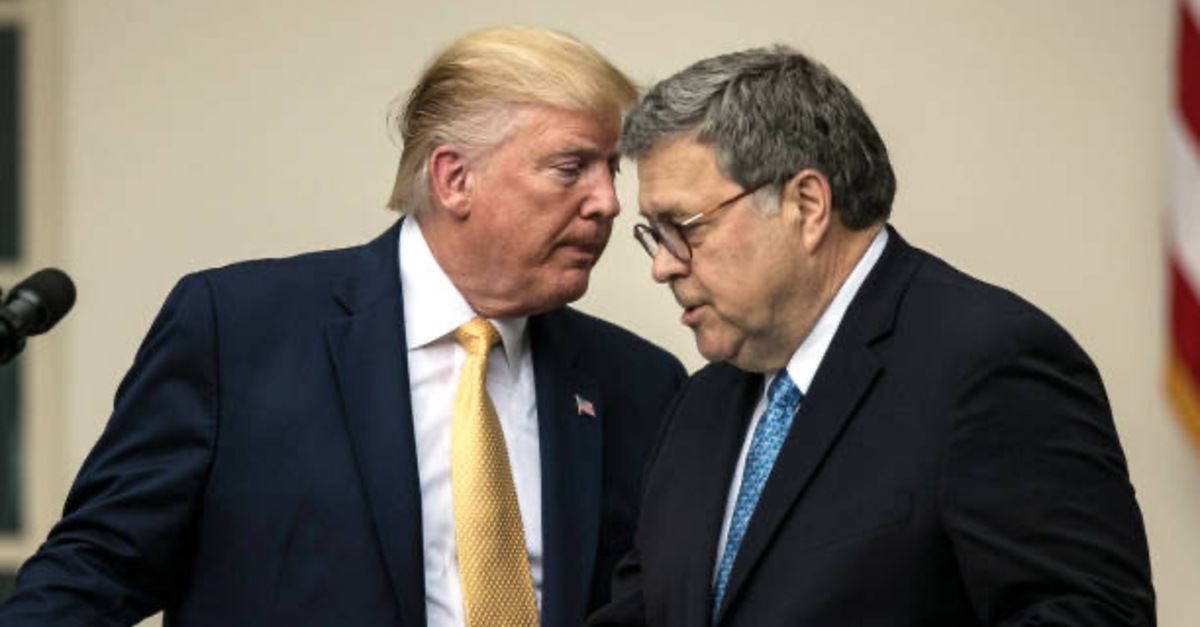
U.S. Court of Appeals for the District of Columbia Circuit on Friday denied the Department of Justice’s request to stay a mandate to hand over Robert Mueller’s secret grand jury materials to House Democrats, teeing up the issue for the Supreme Court.
In March, the court ruled that the DOJ must release documents long-desired by House Democrats, whose lawyers have time and again raised the prospect of impeaching President Donald Trump for a second time. U.S. Circuit Judge Judith Rogers authored the decision—which was joined by retiring Judge Thomas Griffith. Judge Neomi Rao authored the dissent.
“A reasonable observer might wonder why we are deciding this case at this time. After all, the Committee sought these materials preliminary to an impeachment proceeding and the Senate impeachment trial has concluded. Why is this controversy not moot?” Rao asked. “The majority simply turns a blind eye to these very public events.”
Last week, the DOJ made clear that, “[i]n the event this Court denies a stay of the mandate, the Department respectfully requests that the Court stay the mandate for a reasonable time to permit the Solicitor General to apply for a stay from the Supreme Court.” DOJ notably did not indicate that it would seek a rehearing of the case by the full court.
And on Friday, the court denied the DOJ’s request to stay the aforementioned mandate, saying it would go into effect in 10 days. At the same time, the court also gave Solicitor General Noel Francisco enough time to ask the Supreme Court to issue the sought stay:
Upon consideration of the Department of Justice to stay mandate pending petition for writ of certiorari, which includes a request to stay issuance for a reasonable period to permit the Department to seek a stay from the Supreme Court, and the opposition thereto, it is ORDERED that the motion to stay mandate pending petition for writ of certiorari be denied. The Clerk is directed to withhold issuance of the mandate until May 11, 2020, to permit the Department a reasonable time to seek a stay from the Supreme Court.
What this means is that it will not be long before the ball is in the Supreme Court’s court.
“Holy lord is DOJ fighting like mad to avoid turning over Mueller’s grand jury information to Congress,” remarked CNN legal analyst and former federal prosecutor Elie Honig.
The Democratic chairman of the House Judiciary Committee also had some thoughts.
“More than a year ago, @HouseJudiciary issued a subpoena for the grand jury information redacted from the Mueller Report. Two courts have already agreed that DOJ has no legal basis to withhold this material, and today the Admin’s attempt to delay and keep this information from Congress was again rejected,” Rep. Jerrold Nadler (D-N.Y.) said. “The Administration has an obligation to hand over this grand jury material from the Mueller Report, and it should stop needlessly delaying production.”
The DOJ has long fought and wrangled over the issue of what constitutes a judicial proceeding.
DOJ argued for a very limited understanding of that term—claiming that impeachment hearings and trials didn’t qualify and that releasing the materials would irreparably harm the agency’s legal interests. Democrats on the other hand said—and the court ultimately agreed—that precedent held the term sustained a fairly broad definition.
As Law&Crime previously reported, a lower court in the District of Columbia previously reached more or less the same conclusion.
In a separate matter on the district court level back in March, George W. Bush-appointed Judge Reggie Walton ordered the DOJ to hand over an unredacted version of the Mueller report so he could review what was redacted. He made some pointed remarks about Attorney General William Barr’s handling of the Mueller report. Most recently, Judge Walton set June 18 as a target date for reviewing the reductions, but that is subject to change.
Colin Kalmbacher contributed to this report.
[Image via The Asahi Shimbun via Getty Images]